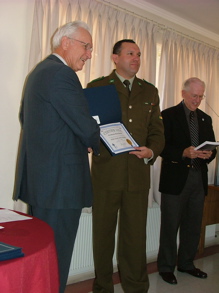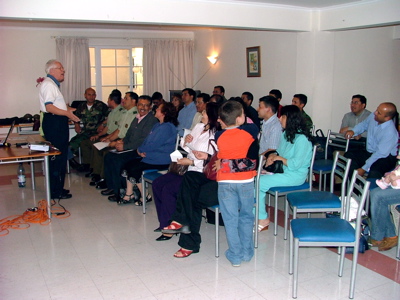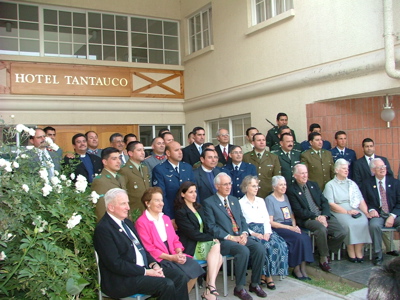 Still, Windmiller, who is an ordained minister in the Evangelical Covenant Church, was impressed enough with their work that he accepted the position. He told the leadership they would have to wait six months, however, until he finished his interim pastorate at Hillcrest Covenant Church in DeKalb, Illinois. So they waited.
Still, Windmiller, who is an ordained minister in the Evangelical Covenant Church, was impressed enough with their work that he accepted the position. He told the leadership they would have to wait six months, however, until he finished his interim pastorate at Hillcrest Covenant Church in DeKalb, Illinois. So they waited.
Since his service ended at Hillcrest in June, the 75-year-old Windmiller has traveled to Chile and Peru to train those nations’ first evangelical military chaplains.
Since its inception in 1988, the IAEC has grown to include members in 58 countries on five continents. They have completed training in a number of countries, including places like the Philippines, Singapore, Guatemala, and Trinidad.
Windmiller says the organization has three primary objectives: encourage current and prospective chaplains, train current and prospective chaplains, and help other nations start military chaplain programs as long as the governments allow evangelicals to participate.
Windmiller is well suited to lead the organization, having served 28 years as a U.S. Army chaplain, including duty tours in Vietnam and as commandant of the U.S. Army Chaplain School. Since leaving the military, he has served as interim pastor at six Covenant churches in Illinois. He also has served as chair of the Princeton Children’s Home board.
 The training he gave this summer was groundbreaking. Legislation that is expected to receive final approval in Peru and Chile will allow evangelicals to participate as military chaplains for the first time, Windmiller says. Previously only Catholic priests were allowed.
The training he gave this summer was groundbreaking. Legislation that is expected to receive final approval in Peru and Chile will allow evangelicals to participate as military chaplains for the first time, Windmiller says. Previously only Catholic priests were allowed.
Windmiller says he isn’t sure why there is sudden openness to evangelical chaplains, but suggests it may be because so many members of the military are evangelicals. He has heard estimates that 25 percent of the Argentinean Air Force is of an evangelical religious persuasion. “These young men and women have spiritual needs,” he notes.
In Peru, Windmiller trained 26 men and one woman, all of whom currently serve or are retired from the National Police. They will begin to serve as chaplains in about six months. The 34 men and one woman he trained in Chile currently serve or are retired from the Chilean Army or National Police.
Windmiller is using material from the U.S. military’s chaplaincy training program to educate the new students in the two-week program. Topics include the proper relationship between commander and chaplain, how soldiers can serve as Christians, ethical decision-making, suicide prevention and pastoral counseling.
 The IAEC is invited to train chaplains through the Association of Military Christian Fellowship (AMCF), which exists to support active and retired lay members of the military. “Almost every country in the world has Christians who are in the military,” Windmiller says.
The IAEC is invited to train chaplains through the Association of Military Christian Fellowship (AMCF), which exists to support active and retired lay members of the military. “Almost every country in the world has Christians who are in the military,” Windmiller says.
Phase two of the chaplain training program includes self-directed reading and working for a brief period under the supervision of the AMCF in a church, Windmiller says.
Windmiller is not done traveling. He goes to Zambia in April, where he will train chaplains from eight African countries including Congo, Botswana, and Zimbabwe. He anticipates that roughly 60 people will participate. He also hopes to travel to Brazil, where he will conduct classes for seminary students interested in becoming military chaplains.
Editor’s note: The top photo shows Windmiller presenting a graduation certificate to one of the graduates in the Chile program. The center photo was taken during one of the training classes in Chile, and the bottom photo shows the Chile graduating class at the conclusion of the graduation ceremony.
